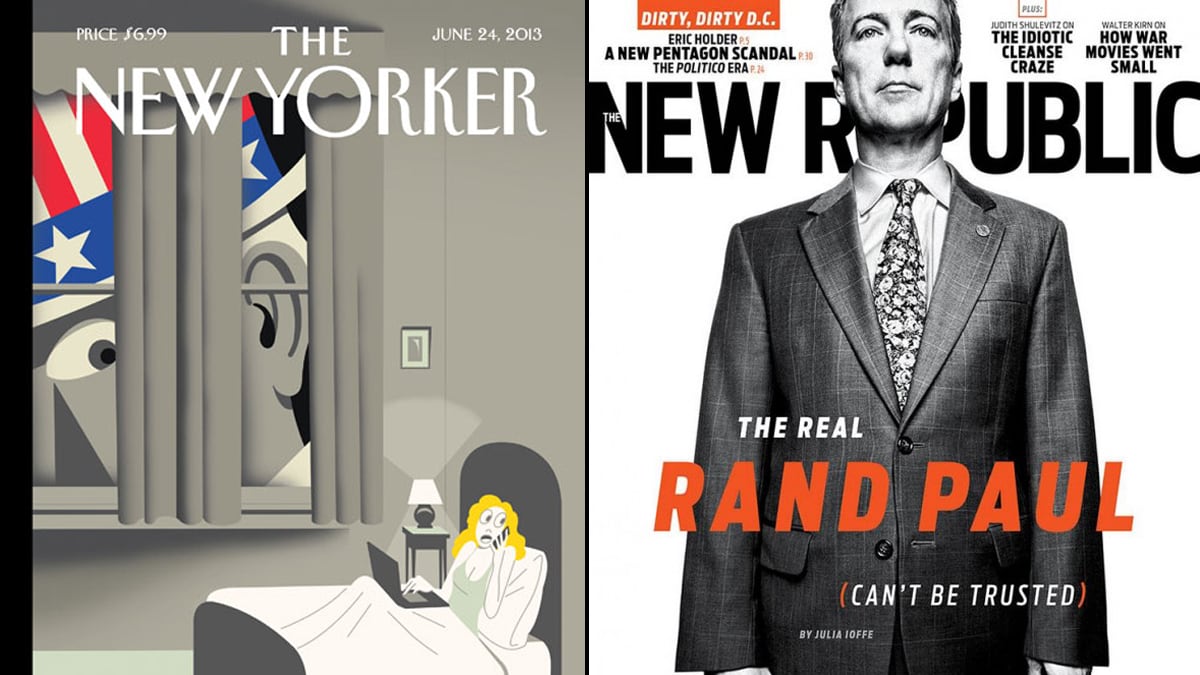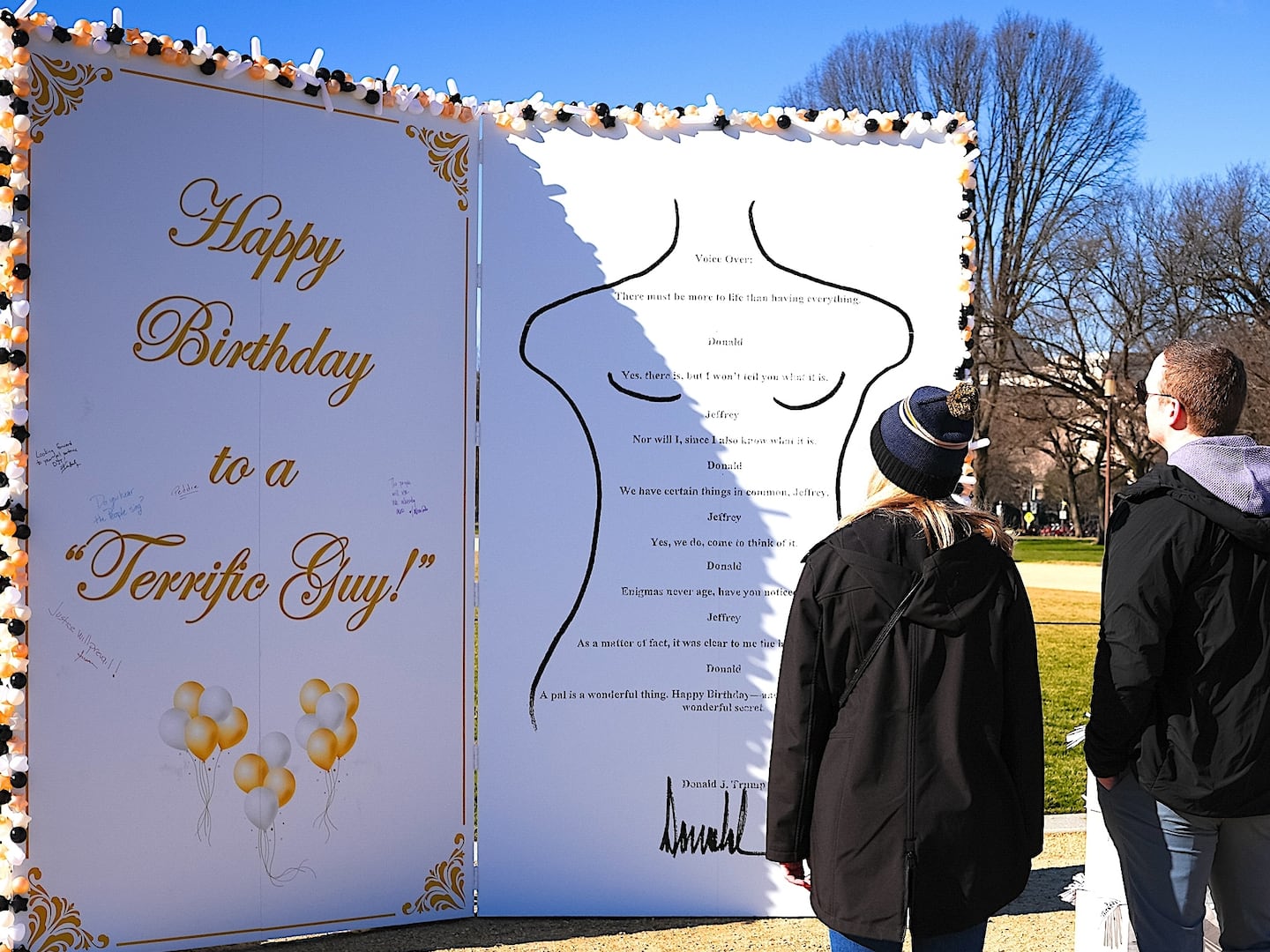Remember that big Nancy Pelosi profile in The Weekly Standard? Or the time Elizabeth Warren sat for a long interview with Fox News’ Sean Hannity? How about the big RedState.com Q&A with Joe Biden?

If you missed them, perhaps it’s because such meetings of liberal pols and the conservative press are comically rare. But not on the other side of the aisle. On Monday, two proudly progressive publications, The New Republic and The New Yorker, hit with big stories about, respectively, Kentucky Sen. Rand Paul’s and the Senate’s efforts to pass an immigration-reform bill. In the first instance, Paul was portrayed largely positively, except for the cover, where he was photographed with his fingers crossed, under the headline “The Real Rand Paul (Can’t Be Trusted).” Plus, he was quoted telling a group of college students, “I am not a firm believer in democracy.” In the second piece, an aide to Florida Sen. Marco Rubio, who like Paul is considered a frontrunner for the GOP presidential nomination, was quoted disparaging American workers, saying the immigration-reform bill Rubio is pushing needs to pass because American workers are not “star performers.”
The Rubio camp quickly distanced the lawmaker—who did not participate in the story—from the quotation. But the dual profiles left some Republican media strategists and consultants wondering why two of their leading lights were getting waylaid by left-leaning outlets in the mainstream media when there are plenty of conservative talk-radio shows and Web sites to choose from.
“One of the big problems we [Republicans] have is that the vast majority of our communications people are inside the D.C. beltway,” said Dave Carney, chief strategist for Texas Gov. Rick Perry. “The traditional communication strategy is that any media is good media. It is hard to resist the temptation.”
Staffers, he said, have to be judicious with a candidate’s time and should not schedule interviews unless they are certain how it will help the candidate. And they must resist the tempting talk of reporters who pitch them on why a piece in their outlet will be good for them.
But other GOP politicos see engaging the mainstream media as part of a larger effort to help the Republican Party break out of its ideological ghetto in the wake of 2012’s election losses. They point to Chris Christie—a regular on left-leaning MSNBC’s Morning Joe (he is slated to appear again Tuesday morning) who has traded jokes with Jon Stewart and Jimmy Fallon on late-night television—as preferable to another sit-down with Rush Limbaugh.
“There is a theory that says that the mainstream media will never accept you, so don’t even try, and that the conservatives who did this are pandering or are narcissists who just want to get attention,” said Matt Lewis, a conservative activist and columnist. “I reject that. There is a potential for mistakes, but if you believe in your candidate, you can’t keep them just in ideologically friendly media outlets.”
And participating in a story can have some advantages, he added.
“Rubio didn’t participate in The New Yorker story, and he got burned,” Lewis said. “Journalists love accessibility. If you make relationships with them, even if they hit you, it will be a Level 7 hit rather than a Level 10 hit.”
To be sure, there are pitfalls. Rubio was tripped up last year in a Q&A with GQ when he suggested that the Bible contained the scientific truth about the age of the planet. In 2010, delighted liberals passed around a video of Paul, then a candidate for Senate, in which he struggled to explain to MSNBC host Rachel Maddow his views on the Civil Rights Act of 1964.
Greg Mueller, a conservative public-relations executive who worked on Steve Forbes’s and Pat Buchanan’s presidential campaigns, said candidates who are willing to take on all comers in the earliest days of a presidential cycle signal that they can withstand the rigors of a campaign.
“When you run for president, you have to demonstrate that you can handle all kinds of media outlets,” Mueller said. “Conservatives should not be afraid of standing firm on their issues.”
And if it is a hit-piece, all the better.
“I can’t tell you how many times, when there is a biased piece against you, you can raise good money off it from conservatives,” he said.
Mueller added that conservatives are more willing to go into the liberal lions’ den because both sides of the aisle believe there are more robust liberal outlets. Pelosi and Biden don’t need to go on Fox because there are plenty of less antagonistic press outlets anxious for their appearance. Not so for conservatives.
And conservatives cited another reason for engaging all comers after the 2012 elections: if their ideas are better, as they maintain, then they have to expound those ideas in as many places as possible.
“We live in a multi-various media environment,” said Rick Wilson, a GOP media consultant. “We don’t live in a world where you can usefully advocate for a major policy change by talking only to National Review and The Weekly Standard. Those places have their own merits, but you have to address a broad spectrum in order to communicate complex policy issues.”
Plus, he added, “If your ideas are strong and you are confident about what you are advocating, you don’t care where you go to advocate them. You want the opportunity to influence the public discussion.”
Still, the media consultants interviewed for this article urged some caution. The New Republic and The New Yorker are publications that “take ideas seriously,” said one operative. And while they may have an ideological slant, they are not wedded to it. In other words, don’t expect to see a Chris Christie Q&A in Dissent anytime soon.
And by this logic, operatives said, MSNBC is OK, so long as candidates stick to Morning Joe or The Daily Rundown.
“You don’t need home-field advantage, but you don’t want to be playing an away game all the time either,” said Lewis.
Still, Perry strategist Carney wouldn’t have it, all but ordering 2016 contenders away from 30 Rock or any outlet that doesn’t get wide distribution in the heartland of conservative readers and viewers.
“There is this old-fashioned rule that any media is good media, but there are not a lot of conservative activists who are watching MSNBC,” he said. “So why are you on there? The upside is zero. The idea that you can show you have a repartee—or whatever the fucking word is—with the hosts and you talk with the New York media elite is not endearing you to the voters.”






